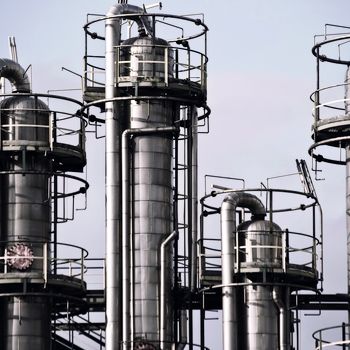
In power plants, high-alloy steel coatings are bonded onto metal components that are subject to extreme wear and/or corrosion using so-called cladding techniques. For longest service life, it is essential that the coating material is applied with uniform thickness. Continuous monitoring of the thickness is mandatory.
In power plant applications, cladding treatments are used to protect membrane walls and platen heating surfaces that are exposed to aggressive exhaust gases or severe abrasion. In the cladding process, a high-alloy protective coating is fused to a lower-alloy substrate material. For typical wall membranes of 4-5 mm thickness, the depth of the protective coating will be about 2-3 mm.
Because of the high stresses the coating is exposed to and the potential risks associated with coating failures, it is imperative to monitor the layer thickness continuously as part of the cladding procedure, so that corrective measures can be undertaken just as soon as deviations are detected. The testing should be easy to do, because many repetitions are necessary. For example, for third-party inspection and final acceptance of an average size co-generation plant, the TÜV (Germany’s Technical Inspection Association) will require about 10,000 measurements.
The challenging conditions presented by the scale and location of such an assessment task call for a high-performance instrument that is both rugged and easy to use – anywhere. With an FGB2 magnetic induction probe attached to, for example, the handheld FISCHER DELTASCOPE® FMP30, testing the thickness of non- steel cladding coatings is easy and straightforward.
Advantages of the FGB2 probe:
- Large measurement range, up to 5 mm thickness
- Thin tip works well on structured coatings (“welding beads”)
- Heat resistant to 80°C for measurements on warm coatings
- Robust and stable: tested in rigorous applications by renowned power plant manufacturers
High-alloy steel cladding coatings used as surface protection in power plants are easy to measure precisely and accurately with the FISCHER magnetic induction probe FGB2. Together with the handheld DELTASCOPE® FMP30 instrument, the heat-resistant probe forms a very robust and user-friendly measurement system. Your local FISCHER partner will gladly provide additional information.